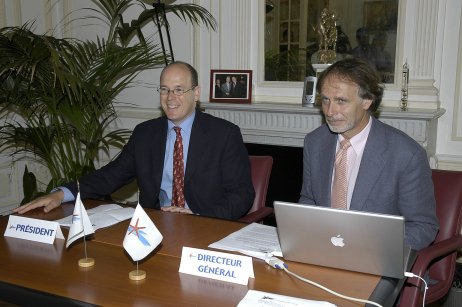 Post-Congress comments by CIESM President and DG Post-Congress comments by CIESM President and DG
29 June 2004, CIESM News
In the aftermath of a very successful 37th Congress (early June 2004, Barcelona, Spain), the President and the Director General of the Commission held a press conference at CIESM Headquarters in Monte Carlo (see photo below), reflecting on some major findings and issues tracked by the Organisation.
The President, H.S.H. Prince Albert of Monaco, emphasized the trans-frontier, multi-lateral approach of CIESM. "Our organisation", he said, "is proud to promote active collaborations between scientists located in countries engaged in conflicts. In this troubled region of the world, marine researchers of the Commission work in a spirit of dialogue and cooperation, counter-current to the actual climate of fear, misunderstanding and even hatred between their nations, thus providing a unique oasis for peace". He explained

CIESM President, H.S.H. Prince Albert of Monaco with CIESM Director General, Prof. Frédéric Briand, during press conference of 28 June.
photo: G. Luci
how CIESM works, providing a climate based on up-to-date science, trust and total freedom of scientific expression. This had fostered throughout the years rare, lasting cooperations between scientists from both north and southern shores, including the Black Sea, particularly between Israel and North Africa, or from Turkey and Greece.
The Director General, Professor Frédéric Briand, reported on some of the recent, major findings of CIESM programmes :
- Western Mediterranean waters are experiencing a substantial warming trend (+0.2°C in last 10 years), which may have a drastic impact on deep-sea species accustomed to live in the dark at a near-constant temperature of 13°C ;
- Sea level is rising significantly in the Eastern Mediterranean, with an average 12-cm rise registered on the Levantine coast since 1992 ;
- The change in marine biodiversity is proceeding at an unprecedented pace, as hundreds of exotic species -- mostly of tropical Indo-Pacific origin -- have settled in recent decades in the Mediterranean Sea ; the trend appears to be accelerating with the rapid growth of maritime traffic which brings with it its lot of associated alien fauna (introduced via ballast waters or attached to the hull);
- The rate of coastal erosion in many Mediterranean shores seems alarming - the result of unregulated sand mining for construction, sprawling touristic (marinas, hotels) and urban infrastructures, river daming, etc.
- Thousands of new species of marine viruses and bacteria await to be discovered by science ; their role in ecosystem processes and for potential use in medicine will represent a fast growing sector of oceanography.
Frédéric Briand concluded that "the health of the Mediterranean Sea is no better and no worse than that of the world' Oceans. The "Inner Sea" is actually an excellent indicator of global trends and changes in the marine environment, offering a rare opportunity
- to study, on a manageable scale , oceanographic processes, marine biodiversity, the impact of contaminants; and
- to explore fascinating, largely unknown deep-sea ecosystems and species within less than a day of navigation from shore".
Finally the Director General called for urgent and massive funding to support marine sciences, comparable to that available for space exploration, so that we may learn at least as much about the fragile, threatened marine life of our Planet, as about the remote possibility of life in outer space.
|



